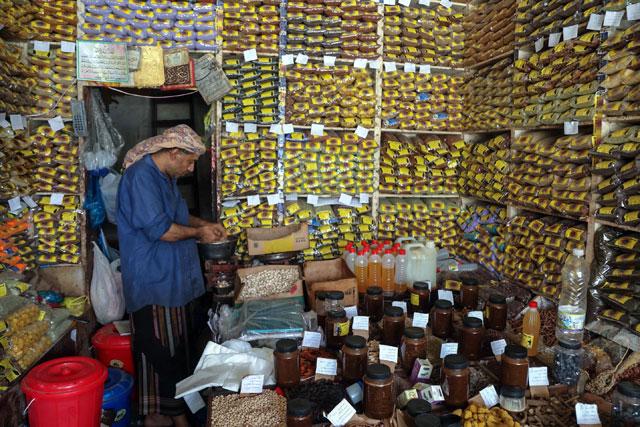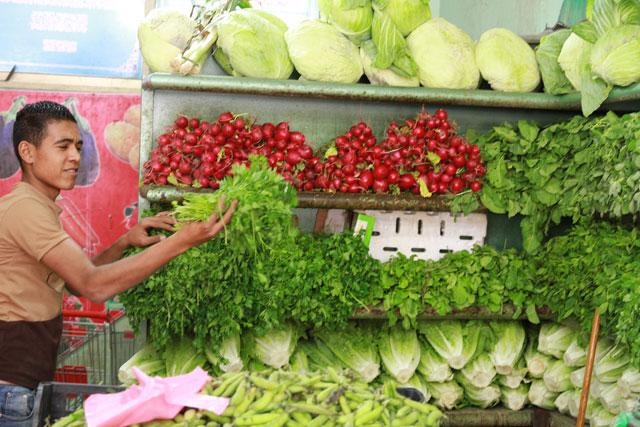You are here
Yemenis turn to herbal remedies as fears mount over virus toll
By AFP - Jun 24,2020 - Last updated at Jun 24,2020

A Yemeni vendor works at his shop selling medicinal plants and spices at a market in Yemen's third city of Taez, on June 15 (AFP photo)
TAEZ, Yemen — As medicines run short and hospital wards overflow, Yemenis are resorting to traditional herbal remedies to protect themselves from coronavirus in a country broken by years of conflict.
Yemen has so far officially recorded under 1,000 cases of the disease, with 257 fatalities, but most clinics are ill-equipped to determine causes of death and there are ominous signs that the real toll is much higher.
The country's health system has all but collapsed since war broke out between the government and Houthi rebels in 2014, and more than two thirds of the population of about 24 million need aid to survive, according to the United Nations.
In the southwestern city of Taez, market vendors stack bags of herbs and spices in front of their shops — from garlic, ginger and turmeric to costus root and fennel flower — at prices much more affordable than modern medicine.
"Many people are coming to buy medicinal herbs to make concoctions believed to be successful in combatting the virus," said one vendor, Bashar Al-Assar, at the popular Al Shanini Market.
The remedies are "guaranteed, tried and effective" to strengthen immunity, he told AFP.
The virus crisis is just the latest hardship for Taez's population of more than 600,000, who have long been trapped within the city limits.
While it is controlled by pro-government forces, Taez is under siege from the Houthis who occupy the mountains that surround the city, from where they have launched repeated bombardments.
Taez has so far recorded 50 coronavirus deaths, the second highest for a Yemeni city after Hadramaut's 111 deaths, according to government data.
But patchy accounts from overwhelmed hospitals, and scientific modelling, indicates this is just a fraction of the real impact.
The London School of Hygiene and Tropical Medicine said in a study that, with no mitigation measures in place, there may have been between 180,000 and three million coronavirus cases in the first three months of the outbreak in Yemen.
Its model predicts there could be up to 11 million people infected, with between 62,000 and 85,000 deaths, in an eventual worst-case scenario.
'No staff, no medicine'
According to residents and doctors in Aden, the southern city where the government is based, hospitals are overcrowded and under extreme pressure because of the number of COVID-19 cases.
"We have no preparations, no equipment, not enough medication, and not enough medical staff to combat the spread of the virus," Jalal Nasser, a doctor at a hospital in Aden, told AFP.
"There is no trained staff to deal with the pandemic."
The situation in the rebel-held capital of Sanaa is unclear, with the true picture hard to determine as the insurgents have abstained from reporting cases other than two infections announced in early May.
The outbreak comes on top of diseases such as cholera, malaria and dengue that continually ravage the country due to a lack of proper sanitation or healthcare facilities.
In a country that the UN has described as the world's worst humanitarian disaster, millions are on the brink of famine and others live in makeshift camps where social distancing is impossible.
Ishraq Al Sibai, the spokeswoman for Yemen's national emergency committee for COVID-19, warned that herbal remedies risked harming people's health, but that Taez had little to offer in terms of modern treatment.
"There are 40 isolation beds, six ventilators, not enough medical staff... and a shortage of medicines," she said. "This is a big problem."
'Don't forget Yemen'
Munir Ahmed Ghaleb was one of the shoppers at the Taez market looking to buy herbs.
"The price of medication has increased insanely, and now a citizen must resort to the local market for essential medicinal herbs, such as garlic, to fight the virus," he told AFP.
Before the coronavirus outbreak there was very little demand for herbal concoctions, said the vendor Assar, while today "it stands at 100 per cent".
Aid organisations have warned that a full-blown coronavirus outbreak in Yemen would have dire consequences, and called on the international community for support.
The UN raised some $1.35 billion at a virtual donor conference co-hosted by Saudi Arabia in early June, but it fell far short of the $2.41 billion target.
"As the world continues its fight against this global pandemic, it must not forget countries like Yemen that need their support," the World Health Organisation said.
Related Articles
For children under age 12, decongestants might ease the common cold symptoms of a blocked or running nose, but these medications may n
AMMAN — The Ministry of Agriculture on Wednesday urged farmers to focus on growing leaf and root crops, whose exports generate more than tri
Herbal vinegars are a delightful way to blend the rich flavours of freshly home-grown herbs with a tangy zest.


















